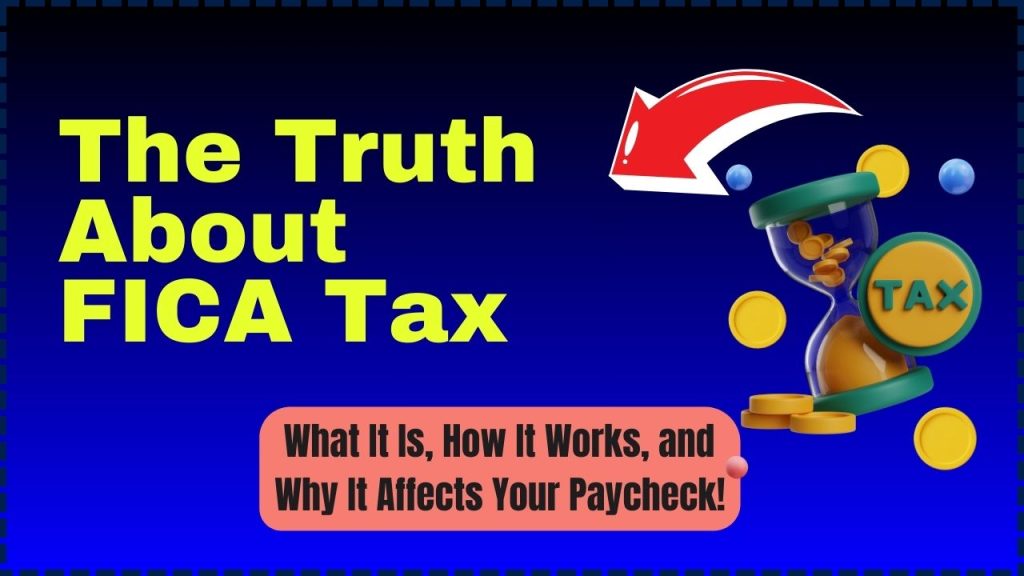The Truth About FICA Tax: If you’ve ever looked at your paycheck and noticed deductions for something called FICA tax, you might have wondered what it is, how it works, and why it impacts your take-home pay. Understanding FICA tax is crucial for every worker, whether you’re just starting out in your career or have been employed for years. FICA stands for the Federal Insurance Contributions Act, and it plays a significant role in funding two essential government programs: Social Security and Medicare.
In this article, we’ll break down exactly what FICA tax is, how it’s calculated, why it’s taken out of your paycheck, and how it impacts your overall financial future. Whether you’re a full-time employee, a freelancer, or someone working part-time, this information will help you understand how FICA tax affects your earnings and future benefits.
The Truth About FICA Tax
Understanding FICA tax is essential for every worker in the United States, as it directly impacts your paycheck and future financial security. While it may feel like a significant deduction, it plays a crucial role in funding Social Security and Medicare, two programs that provide essential support in retirement and times of need. By knowing how FICA tax works, how much you pay, and why it’s important, you can better plan for your financial future and ensure you’re getting the most out of your earnings.

| Aspect | Details |
|---|---|
| What is FICA? | FICA stands for Federal Insurance Contributions Act, which funds Social Security and Medicare. |
| How Much is Taken? | The total FICA tax rate is 7.65% for employees, split between Social Security (6.2%) and Medicare (1.45%). |
| FICA for Self-Employed | Self-employed individuals pay the full 15.3% FICA tax rate, which includes both the employee and employer portion. |
| FICA and Social Security | The Social Security portion of FICA helps fund retirement, disability, and survivor benefits. |
| FICA and Medicare | The Medicare portion of FICA helps fund healthcare for individuals over 65 and those with certain disabilities. |
| FICA and Your Paycheck | FICA tax directly impacts your paycheck by reducing the amount of money you take home. |
| Official Sources | IRS – FICA Tax Information |
What Is FICA Tax?
FICA tax is a payroll tax that is automatically deducted from your paycheck to fund two of the largest entitlement programs in the United States: Social Security and Medicare. These programs provide critical financial support to millions of people, including retirees, individuals with disabilities, and people over the age of 65 who need healthcare.
FICA stands for Federal Insurance Contributions Act, which is a law passed by Congress in 1935. The purpose of this law was to provide financial support to people when they retire, become disabled, or need healthcare services as they age.
The Social Security portion of the tax helps fund retirement benefits and other related programs like disability and survivor benefits. The Medicare portion funds healthcare for elderly and disabled individuals.
How Much Is FICA Tax?
As an employee, the total amount of FICA tax you pay is 7.65% of your taxable income, split between two main programs:
- Social Security: 6.2%
- Medicare: 1.45%
This means for every dollar you earn, 7.65 cents will be deducted for FICA taxes. These percentages are the same for everyone who earns up to a certain income threshold.
Social Security Tax
The 6.2% Social Security tax helps fund the Social Security program, which provides retirement benefits, disability benefits, and survivor benefits. The amount of Social Security taxes paid is subject to an income limit called the Social Security wage base, which changes annually.
For example, in 2024, the Social Security wage base is $160,200, meaning that any income earned over this amount will not be taxed for Social Security. If you earn more than $160,200 in 2024, you’ll stop paying Social Security taxes once your total earnings exceed this threshold.
Medicare Tax
The 1.45% Medicare tax helps fund the Medicare program, which provides health insurance to individuals aged 65 or older, as well as certain younger individuals with disabilities. Unlike Social Security, there is no income cap for Medicare taxes. This means that all earnings are subject to the Medicare tax, regardless of how much you make.
Additionally, for high-income earners, there is an additional 0.9% Medicare tax on wages over $200,000 for individuals or $250,000 for married couples filing jointly. This tax is only paid by the employee, not the employer.
Why Does FICA Tax Affect Your Paycheck?
FICA tax directly impacts your paycheck because it is automatically withheld by your employer. This means the 7.65% is taken out of your earnings before you see the money in your bank account. Here’s a breakdown of how it works:
- Automatic Payroll Deduction: Employers are required by law to withhold FICA tax from your paycheck each pay period. They match the amount you pay and send the total to the IRS, ensuring that both you and your employer contribute to the Social Security and Medicare funds.
- Employee Contribution: As an employee, you contribute 7.65% of your wages toward FICA taxes. This is automatically deducted from your paycheck, and your employer is responsible for submitting the tax to the IRS.
- Employer Contribution: Your employer also pays 7.65% of your wages to FICA, but this amount is not deducted from your paycheck. Instead, it is an additional cost to your employer.
Example: How FICA Affects Your Paycheck
Let’s say you earn $1,000 in a given pay period. Here’s how the FICA tax would be broken down:
- Social Security (6.2%): $1,000 x 6.2% = $62
- Medicare (1.45%): $1,000 x 1.45% = $14.50
So, the total FICA tax withheld would be $76.50. Your employer would then match that amount, contributing an additional $76.50 on your behalf.
After FICA deductions, your net paycheck would be $923.50 before any other deductions (like state or federal income taxes).
FICA for Self-Employed Individuals
If you’re self-employed, you are responsible for paying both the employee and employer portions of FICA taxes. This is often referred to as the Self-Employment Tax (SE tax). As a result, self-employed individuals pay a total of 15.3% on their net earnings:
- Social Security (12.4%): This is the combined Social Security tax for both the employee and employer portions.
- Medicare (2.9%): This is the combined Medicare tax for both the employee and employer portions.
However, self-employed individuals can deduct the employer portion of the SE tax when calculating their taxable income, which helps to reduce their overall tax burden.
Example: Self-Employed FICA Tax
If you’re self-employed and earn $1,000 in a given period, your total FICA tax would be:
- Social Security (12.4%): $1,000 x 12.4% = $124
- Medicare (2.9%): $1,000 x 2.9% = $29
The total SE tax would be $153, and you would need to pay this amount when filing your taxes.
FICA and Your Future Benefits
FICA taxes aren’t just something you pay because it’s required—they help fund your future benefits when you retire, become disabled, or need healthcare. Here’s how FICA taxes relate to these programs:
- Social Security: The amount you pay in Social Security taxes throughout your working life is directly tied to your future retirement benefits. Your monthly Social Security check will be calculated based on the amount of income you’ve earned and paid FICA taxes on.
- Medicare: Similarly, Medicare provides healthcare benefits to those over 65, as well as certain younger individuals with disabilities. While you don’t have to pay into Medicare directly, you still contribute to it via FICA taxes throughout your working life.
Both of these programs offer critical support in retirement or in times of medical need, so understanding FICA taxes can give you a better perspective on how your contributions benefit you and others.
IRS Issues Urgent Warning to Retirees: 2024 Deadline – Are You Prepared?
IRS Child Tax Credit $300 Payment 2024, Should you expect it anytime soon?
Extra Cash for Seniors: Social Security Unveils New December Payments!
Frequently Asked Questions (FAQs)
Q1: Why does my paycheck show FICA tax deductions?
FICA tax is automatically deducted from your paycheck to fund Social Security and Medicare, which provide financial assistance and healthcare to retirees and individuals with disabilities.
Q2: Can I avoid paying FICA tax?
No, as an employee, FICA tax is mandatory and cannot be avoided. However, if you are self-employed, you can deduct the employer portion of the self-employment tax when filing your taxes.
Q3: How can I see how much I’ve paid in FICA taxes?
You can see how much you’ve paid in FICA taxes by reviewing your Social Security statement or checking your W-2 form at the end of the year.






